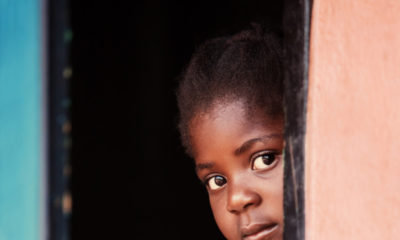Features
Dr. Azibanigha Scott: Let’s Talk About Childhood Obesity
 The month of September, in the United States of America, has been dedicated to creating awareness for childhood obesity. Childhood obesity continues to be an issue globally, with the consumption of processed food, and an increasingly sedentary lifestyle.
The month of September, in the United States of America, has been dedicated to creating awareness for childhood obesity. Childhood obesity continues to be an issue globally, with the consumption of processed food, and an increasingly sedentary lifestyle.
According to the World Health Organization, in 2016 alone, the number of overweight children under 5 years of age was estimated to be over 41 million, and almost half of all overweight children under 5 lived in Asia. One quarter lived in Africa.
As usual, there is very little data in Nigeria regarding childhood obesity. But there is one recent study, done in the Department of Paediatrics, College of Medicine, University of Lagos, by F. A. Akesode and H. A. Ajibode, where they looked at the prevalence of childhood obesity among 457 school children, and found it to be 3.2% for males and 5.1% in females based on weight. According to the authors, there is currently no standard weight for height table, unlike other countries like Sweden and the USA. Therefore, the prevalence of childhood obesity in this study is only an estimate.
One of the foremost studies in the country, regarding childhood obesity, gives an estimate that is significantly lower than the USA, which according to data from the Centre for Disease Control and Prevention is 13.9% among 2 – 5-year-olds, 18.4% among 6 – 11-year-olds and 20.6% among 12 – 19-year-olds. But let’s not get too comfortable with the numbers, as childhood obesity can objectively be seen to be on the rise.
There are so many theories to this, but the most obvious one is the shift toward a more Western diet, and the gross sedentary lifestyle of our children.
A question to ask yourself as a parent is: “What are my children consuming?’’ I know you want to give them a treat every now and then, but there should be a balance. The amount of fats, especially polysaturated fats, in these processed food are alarming!
The incidence of childhood obesity is on the rise, and there are consequences on the overall health of the child, such as:
High blood pressure
The heart has to put more effort into pumping blood around the extra fat. Also, obesity causes resistance in the blood vessels, and this leads to hypertension or high blood pressure. The salt content in unhealthy foods also causes the body to retain water, thereby increasing the blood pressure. In some people, the effect of this may not raise their blood pressure instantly, but this underlying mechanism I have mentioned can make them have high blood pressure as young adults.
Increased risk of developing type 2 diabetes
Yes o, this thing can be serious. Increased fat causes the cells in the body to be resistant to insulin – a hormone that regulates sugar in the body. When this happens, the person can have high blood sugar, which is type 2 diabetes. Please note that diabetes can be seen in the very young, which is when the body destroys the cells that make insulin. This is type 1 diabetes, and the disease mechanism is completely different from type 2 diabetes. There has been a documented increase in the West of increased diagnosis of type 2 diabetes. As usual, little research has been done on this in our environment, but I can confidently say that these trends are global.
Breathing problems and sleep problems
Obesity can cause difficulty in breathing, and in some cases, it can cause asthma. It can also cause a condition where good sleep is impaired as a result of the extra fat around the neck. This causes breathing difficulty at night, and poor sleep after affecting their daily life.
Joint problems
Increased fat puts pressure at the joint, which makes sense, right? The joints are doing more work trying to support the body, so they can have pain and some difficulty moving.
Psychological effect
Apart from the many medical consequences of childhood obesity, there are also psychological effects. Even though we live in a world where we are trying to redefine what beauty is, there is a fine line between accepting yourself for who you are, and being obese and unhealthy. Really obese kids can be mocked in school. They can have low self-esteem as a result. Another end of the spectrum is that as a defence mechanism, they can turn out to be bullies in school, just to prevent being mocked. This is not good either ways.
Some tips to help parents include
- Portion control. Reduce the consumption of processed foods, particularly processed sugars, and incorporating more vegetables and fruits into their diet.
- Try as much as possible to incorporate physical activities into their routine, like jogging with them. On a side note, dear parents, you have to have a healthy lifestyle as a parent to be able to be a model for your children. You can’t reduce their portion without reducing yours, or ask them to jog round the house while you are chilling. In terms of incorporating a healthy lifestyle, you are the best role model for your children, so I guess this article can serve as a push for parents to be a role model.
- Encourage Physical Education (PE) time in schools. Your children spend a lot of time in schools, so during Parents Teachers Association meetings, encourage schools to increase the time spent during PE.
- Visit your family physician regularly to measure your children’s details. Know their weight and height status relative to their peers, or you can download the WHO BMI chart for ages 5-19 and under 5 to keep track of them. This is better done with your physician, so that you can be appropriately counselled.
Finally, childhood obesity is on the rise, and I hope you found this article as a tool to educate and motivate you into having or maintain a healthy lifestyle, as the case may be.






















